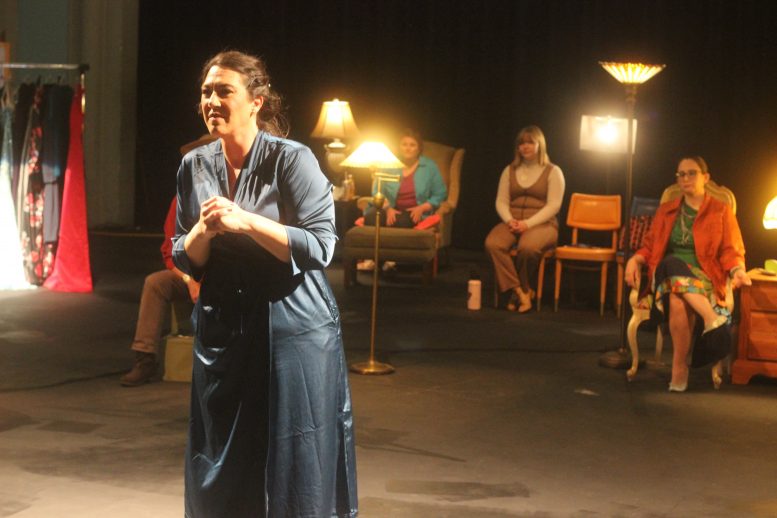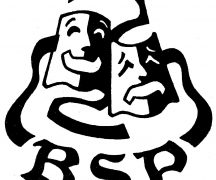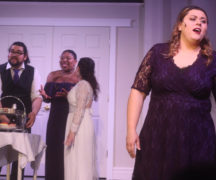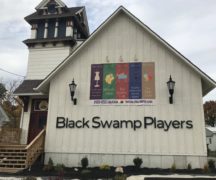By DAVID DUPONT
BG Independent News
On its surface Jane Martin “Talking With…” is a comic, quirky play, a series of monologues by strong female characters that cover the life cycle.
One character, played by Bridget Drew, prays that her one life “will not be normal.”
After hearing the stories of the 11 women portrayed here, the thought occurs that “normality” might not be so common.
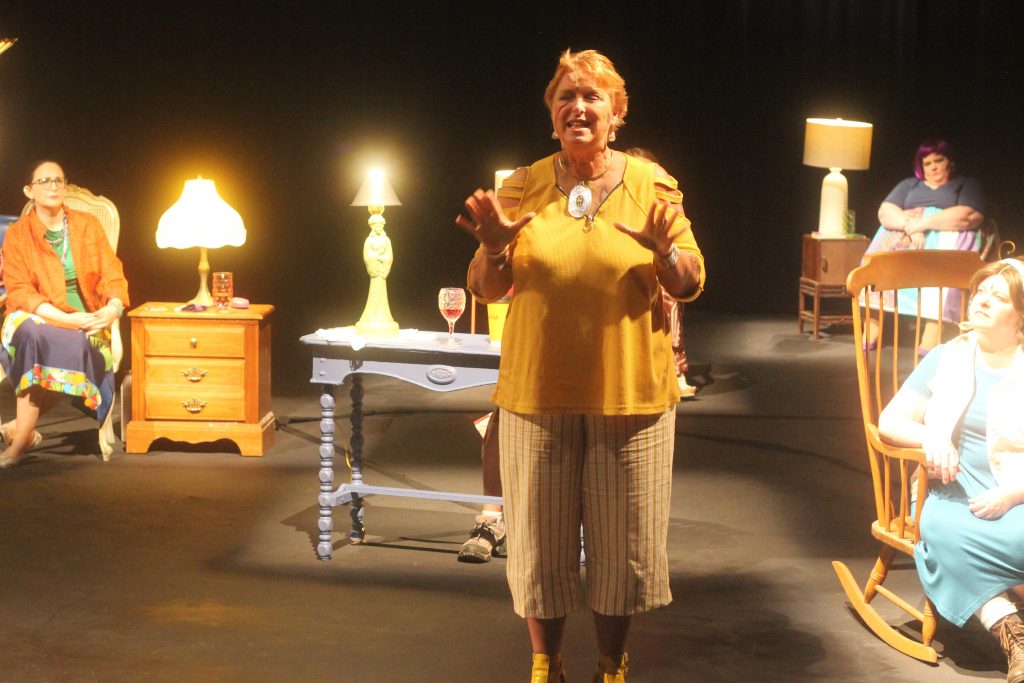
The play closes with the monologue “Marks” performed by Tracy Armentrout. A middle-aged woman, she says if she’d died shortly about the time she graduated from college her epitaph would read: “She did as she supposed she might be told.”
Life’s usual disappointments, though, lead to a darker turn. Let’s just say, if you meet this womean in a parking lot, beware.
For all the surface humor, “Talking With…” goes deep, sometimes dark, but always seeking the light.
The Black Swamp Players are presenting “Talking With…” live at the Ohio Theatre, 3114 Lagrange St., Toledo, Thursday, May 20, Friday, May 21, and Saturday, May 22, at 8 p.m. and Sunday, May 23 at 2 p.m. Tickets are $15 each at www://tinyurl.com/TWBSP. All tickets must be purchased online; no tickets will be sold at the door. A recording of the play will be available on demand from May 28 through June 11.
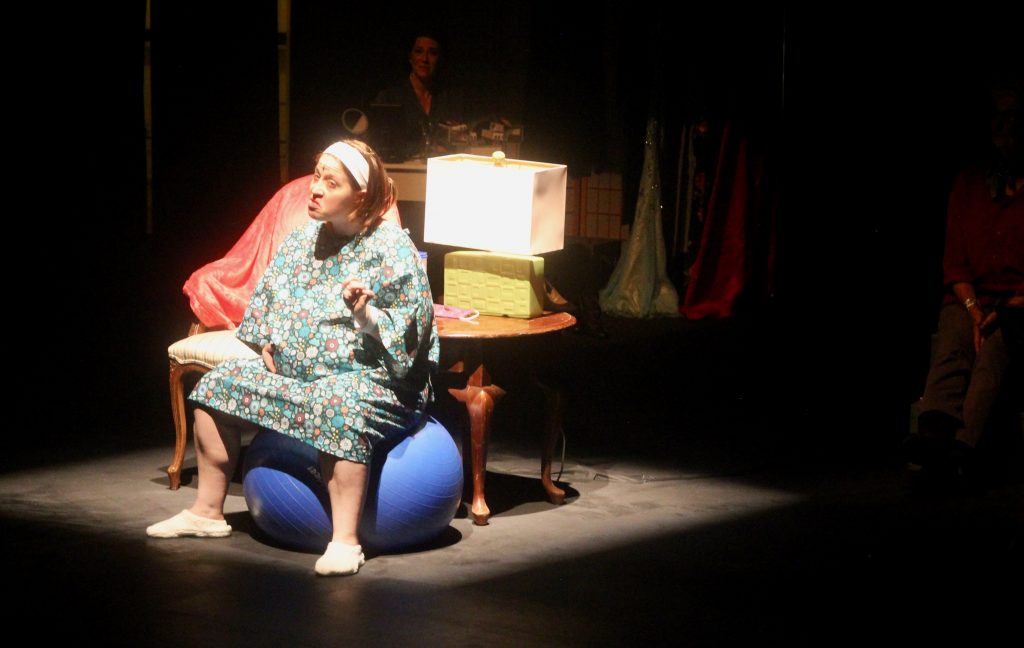
Each of the 11 characters is portrayed with searing honesty by a cast of accomplished actors. There’s plenty of room for condescension here, and not a bit of evidence of it.
All the characters are women from Middle America. Each has a story to tell. Each story burrows deep into the subject’s psyche. Each is in some ways at odds with the people in their lives.
For the actress portrayed by Annelise Clifton, those people are her audience. A performer of middling accomplishments – two Broadway credits – she tells us as she prepares to take the stage: “I’m getting ready for lacerating self-exposure.”
She’d like this to be mutual. She’d like a program delivered to her before each show with bios of all the audience members that lists their foibles and failures.
She steps back to her seat to listen to just that from the 10 women who follow.
Each actor has her own set, a table, chair and a lamp. They form a mostly silent supportive chorus, occasionally joining in a song, or snapping their fingers to signal their approval.
One by one, they stand and speak, and strip away any vestiges of the ordinary.
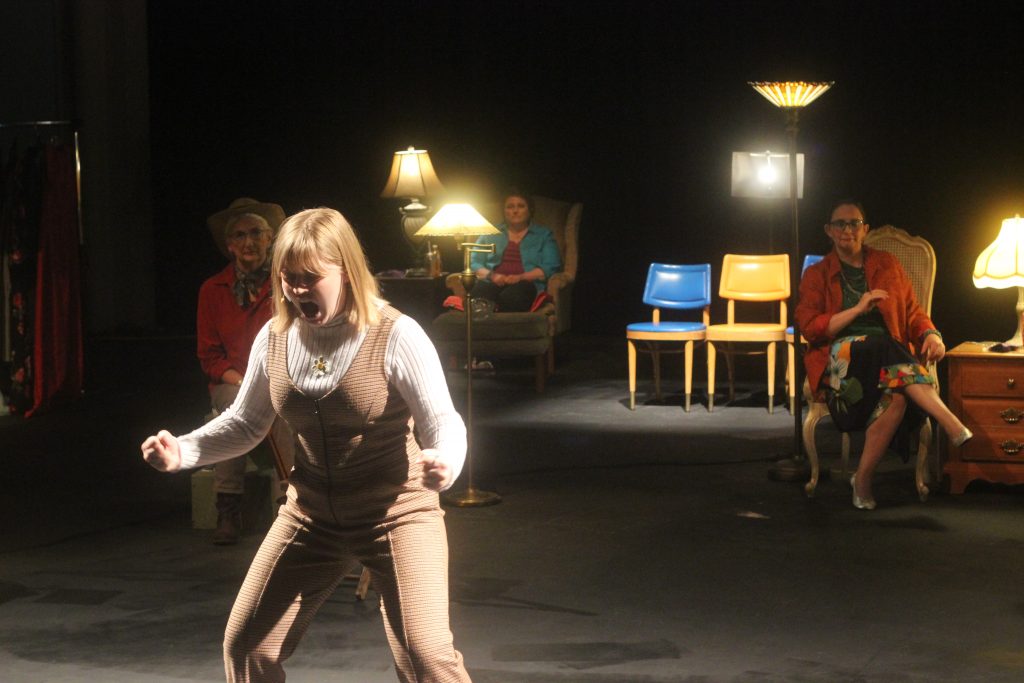
Lorna Jane Patterson, a desperate actor seeking a minor part in a play, promises she will strip to do her “classical” piece. Her hyper banter is amusing, then turns dark very quickly. There’s a cat and a hammer involved.
In “Scraps,” Leah Truman is a woman obsessed with the Oz book series, particularly a character named “Scraps.” She’s dressed as the character when we meet her, seeing her in a guise her husband never has. She can navigate any of the imaginary countries in Oz, better than anywhere in Cleveland.
In “Clear Glass Marbles,” Karen Noble portrays a daughter dealing with the imminent death of her mother. While it is her monologue, the central character is the mother. The father and daughter most cope with the mother’s strong-willed insistence on dying on her own terms, in her own bed, and alone if that’s what she prefers.
In “Dragons,” Bridget Drew’s character is about to give birth, as in 23 hours of labor about to give birth. She’s praying to St. Margaret, the patron saint of childbirth. Tests during pregnancy show the fetus has deformities. Against the advice of her doctor, and with only mildest of support from her husband, she decides to continue the pregnancy. She imagines the child as a dragon.
While the doctor in “Dragons” is the villain – the mom-to-be’s fantasy of physically assaulting him gets a few snaps – business executives are the villains in “Rodeo.”
Deb Weiser plays a rider known as “Big Eight” because of a display of prowess at age 10. She thrived in the rodeo when it was about people riding horses to entertain people who rode horses. The rodeo was full of colorful characters, but not colorful enough for the entertainment executives who bought it up and Disneyfied it. The clowns were dressed like astronauts, she said, claiming this caused one veteran rodeo clown to die from a heart attack.
In “Lamps,” Tiffany Scarola moves about the stage shutting off the other characters’ lamps while philosophizing about how lamps and the light and warmth they shed fill her life. Her sister who visits finds her unhinged and leaves. The woman is undeterred, savoring that final instant before the last lamp is turned off.
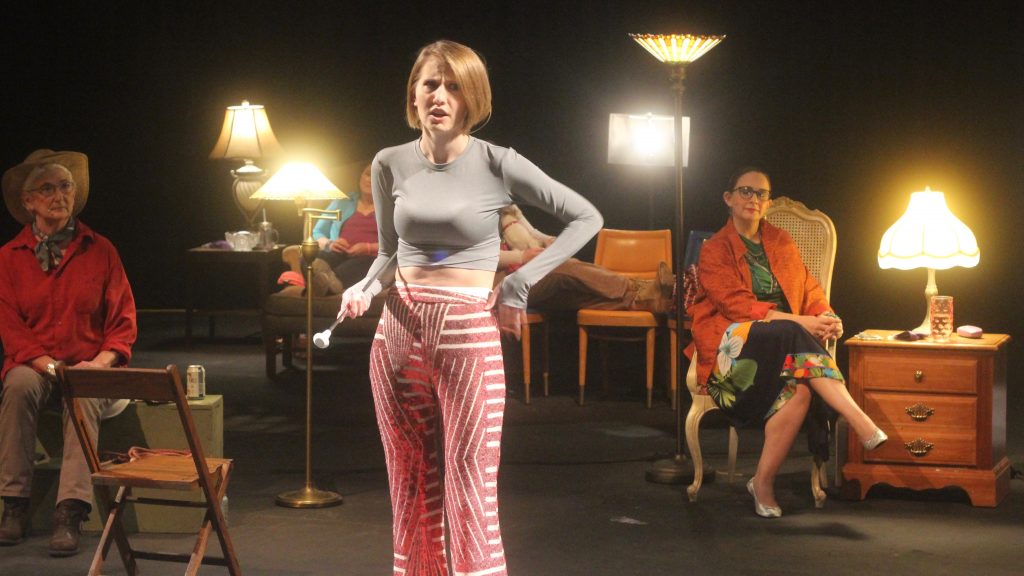
Hali Malecki’s “Twirler,” savors the time when her baton is 30 feet in the air. Once, she said, a champion twirler who was dying of leukemia, tossed her batons so high they acted like windshield wipers and cleared the sky to reveal a rhinestone bedazzled Jesus. Malecki’s twirler was an early bloomer, a rising star on the competitive scene, until she injured her hands in a riding accident. Only then, she said, did she realize the spiritual depths of twirling.
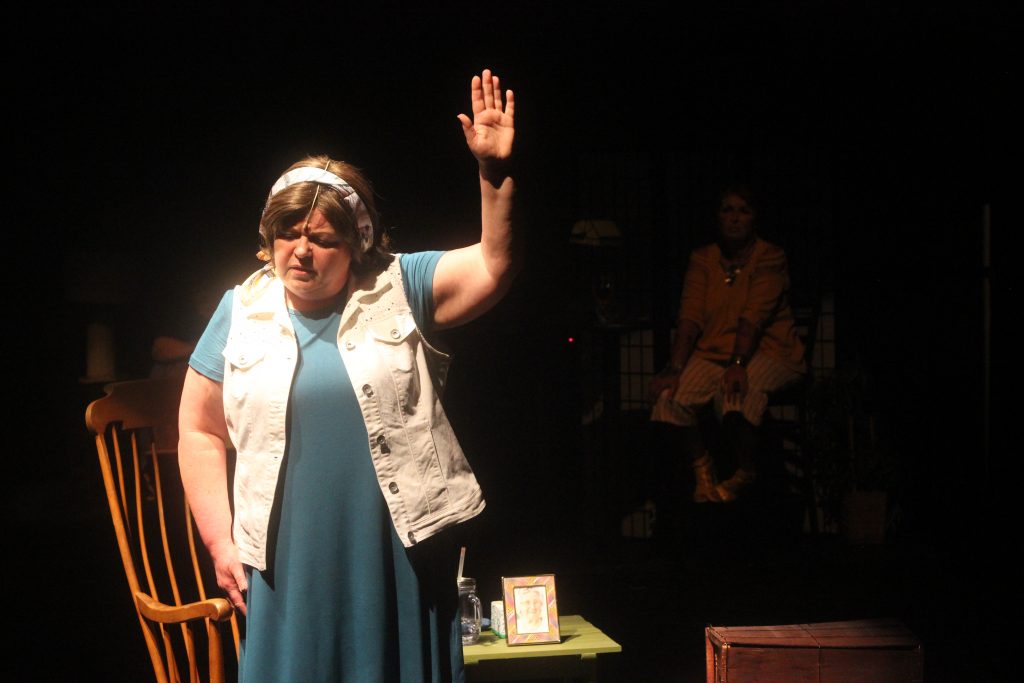
Cyndy Brookover touches those depths as a teenage snake handler. She shares with us the details of the various species of snakes and their characteristics and relative dangers. She tells us what Bible verses support the practice. She tells us about her father whose face is frozen after a snake bites his eyelid. She tells us about the young woman, bitten four times, who dies. And she tells us about how she lost her faith and still faced down a snake.
The woman played by Monica Hiris in “French Fries” is most at home at a McDonald’s, not a Burger King or Kentucky Fried Chicken – people die in those places, she claims. No one dies in McDonald’s.
She will spend the entire day there, in a safe plastic environment. “It’s not safe outside,” she says. God gave people the knowledge of plastic, so they would know what “everlasting” means.
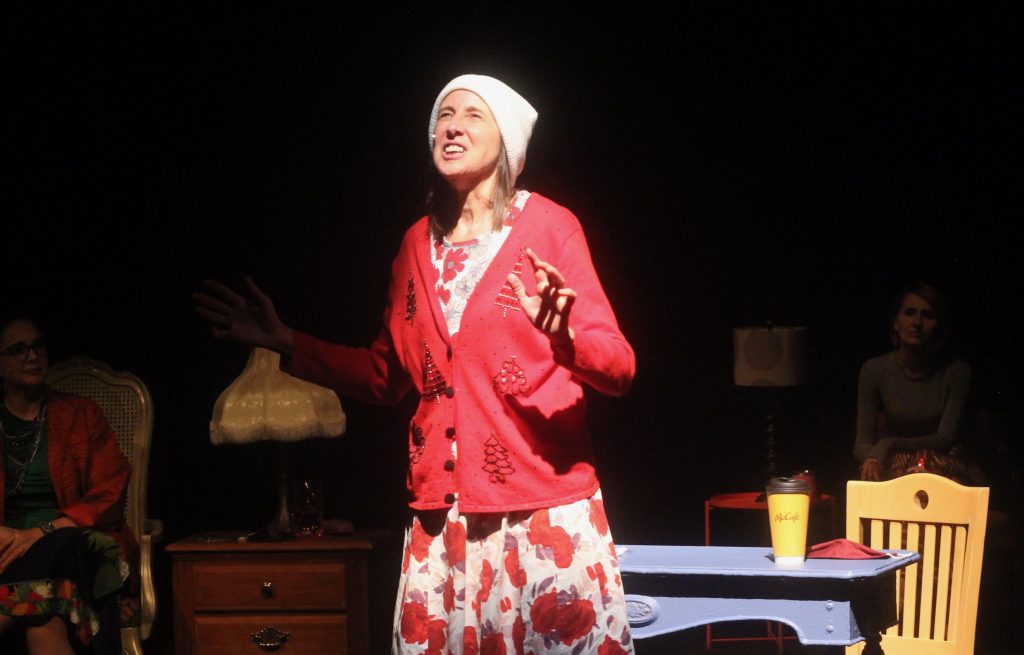
She tells a story of a man, who comes in suffering with tremors, hardly able to eat, who takes a few bites of his Big Mac. Ants crawl out of the burger. The man falls back onto his head, and is cured.
“You have to have a dream,” Hiris’ character says. “Our dreams are what make us what we are.”
The Players’ “Talking With…” explores women shaped by dreams and brings them to life with such vividness that you almost expect you’ll encounter them in the local McDonald’s, theater, or side street in the Land of Oz.

